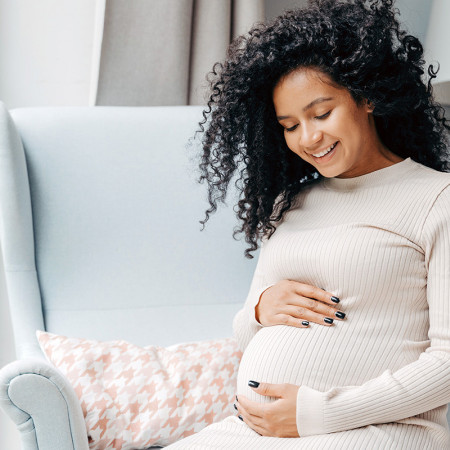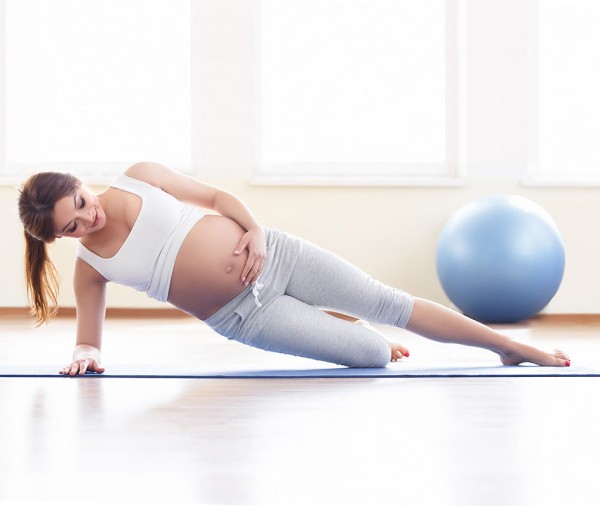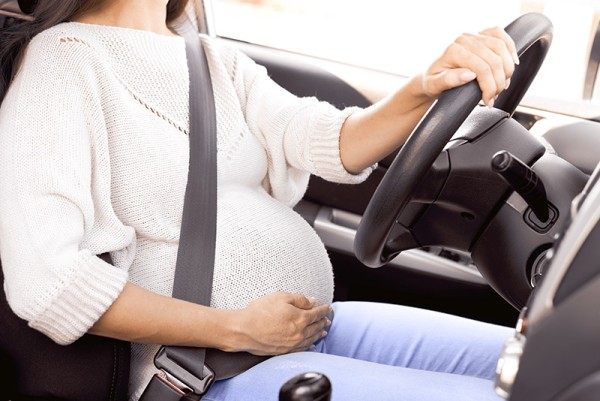
Gorgeous and active!
In great shape

Radiant beauty
Much like other times in life, some days will be better than others in pregnancy. Days when you feel at your best as a woman. And other days when you will despair a bit at your heavier frame.
The beauty and radiance of a future mum depend on the quality of her sleep, on feeling fulfilled, on her capacity to relieve stress and totally relax.
The joy of becoming a mum will show on your face: when you are well rested, you will have a fresh, healthy glow and your eyes will sparkle.
Take care of yourself: use quality moisturisers for your face and body.
Hormones will give pregnant women particularly shiny, silky, and thick hair.
Some women may have greasier hair.
The right approach:
Clay masks can help maintain a balanced scalp.
Your nails may become more brittle: keep them short and avoid nail polish, or use solvent-free polish.
Be sure to go for a dental check up at the start of your pregnancy, and also after the birth of your baby. Your dental condition is important.
Good to know: Untreated cavities may cause infections that could harm your baby.
Brushing your teeth twice a day will help prevent problems.
Your breasts will get bigger from the onset of pregnancy. With the added pressure, their delicate skin may tingle and itch, a sign that your skin is stretching.
The right approach:
Keep your breasts well moisturised using a moisturising cream rather than oil, which will bring softness rather than water.
Wear a well-fitting bra, as your breasts do not have muscles to support this sudden growth. To protect them, watch your posture, slightly tilting your shoulders back.
Towards the end of your pregnancy, your breasts will produce a whitish transparent liquid called colostrum. This will be your baby’s first meal right after birth.
Your wardrobe should be adapted to your new shapes, with loose-fitting, adjustable clothing so you don’t feel restricted.
Remember to change your bra size to feel more at ease: adequate support is still the best way to preserve your breasts.
Wear pumps and other flat shoes for more comfort.
Our answers to your questions
-
These dark spots on white skin or light spots on darker skin generally appear in the 4th to 6th month of pregnancy. They disappear provided you don’t expose yourself to the sun.
This hyperpigmentation is caused by hormonal changes: the spots mostly appear on the forehead and upper lip, creating that mask effect.
Top tip!
Apply day cream with a high sun protector factor daily, and sunblock if you will be going in the sun. Protect your eyes with sunglasses; wear a hat and t-shirt. -
The bane of pregnant women, these zebra markings reveal where the skin’s elastic fibres have torn. Their initial purple colour eventually fades, leaving pearly white traces.
They result from a genetic predisposition. Excessively rapid weight gain further stretches tissues, aggravating the phenomenon. Massaging stretch marks with a special moisturising cream or with sweet almond oil daily for at least 5 minutes may mitigate their appearance.

Don’t worry about staying active!
It’s important to stay fit throughout the 9-month period. You will carry on working and living normally. Why deprive yourself of physical activity? Simply practice moderation.
If you were already athletic, there are no contraindications to continuing your favourite sport.
Sports to prioritise:
- Focus on walking if you are not very sporty, at least 1/2 an hour daily.
- Swimming is the ideal sport during pregnancy, since it is one of the only ones you can keep practising until your due date. Why not try water aerobics or back lengths, which are good for the lower back?
- Yoga is also recommended, as it increases flexibility, gently builds muscle, and teaches optimal breathing techniques. This will give you a head start on childbirth preparation.
Sports that are not recommended:
- Martial arts: judo, karate, etc.
- Sports with a risk of falling: riding, skating, skiing, etc.
- Sports with a risk of hypoxia: deep-sea diving, sprinting, mountain climbing or trekking.
Engaging in moderate, regular physical activity helps you become aware of your body again just as it feels like you might be losing your grasp of it:
- breathing deeply, you learn to manage your efforts and longer breaths, to go the distance,
- you strengthen your abdominal area,
- you activate blood flow, especially through the legs,
- you increase your muscular capacity and flexibility.
If you have a risk of premature birth, follow your midwife’s advice for all physical activities.
Being active has many advantages: it releases stress, lessens anxiety, and takes your mind off any minor daily discomforts of pregnancy.
These are all good family habits to establish before your family gets bigger!
Quality physical training will also support your recovery after childbirth.

Travelling, another way of moving!
Safely tucked in her bubble of amniotic fluid, your baby goes everywhere you go.
Unless you have a high-risk pregnancy, and up to the 7th month of pregnancy, you may continue travelling as long as you take a few precautions:
- Avoid overly long trips
- Remember to hydrate
- Sit comfortably. Tuck a cushion behind your back to reduce lower back pain and fatigue.
- Get up and walk often to stretch your legs and activate your circulation.
Car trips:
Take breaks for at least 10 minutes every 200 or 300 km. Slide your seatbelt under your abdomen so your uterus is not compressed. If you are the one driving, don’t forget that pregnancy can slow reflexes and dull your attention. In the last months of pregnancy, your tummy may feel too awkward for driving.
Boat trips:
You may continue enjoying these as long as you stay near the coast and emergency services, from the 6th month on.
Plane and train trips:
These are preferable to car trips when covering long distances. Your doctor may prescribe a treatment to prevent vascular thrombosis caused by prolonged sitting. Wearing compression stockings may also be recommended. Get up regularly throughout your trip to reactivate your circulation.
In general, the more your pregnancy progresses, and the less you should travel from where you are intending to give birth.